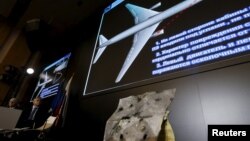The Russian state arms manufacturer of the missile system believed to be behind the downing of Malaysian Air flight MH17 over eastern Ukraine last year says its own investigation into the crash contradicts findings from a Dutch probe into the tragedy.
Speaking at a press conference in Moscow, Almaz-Antey's CEO Yan Novikov said evidence showed the plane was indeed hit by one of its BUK missile systems, as Western nations have alleged, but that the weapon was an older Soviet model no longer used by the Russian military.
Novikov also said his company's analysis also indicated the rocket was fired from territory that Russia says was under Ukrainian government control at the time of the crash.
"Today we can say for sure that the Malaysian Boeing was shot down by a BUK missile 9M38 from [the] direction [of] Zaroshenskoye," said Novikov, referring to the area that was allegedly held by Ukrainian forces.
The Malaysia Airlines flight was downed over eastern Ukraine on July 17, 2014. All 298 people aboard were killed.
Competing presentation
The Almaz-Antey presentation came just hours before the Dutch Safety Board issued its own long-anticipated report on the downing of flight MH17.
Alexander Golts, a defense analyst in Moscow, says the timing of the Russian presentation spoke volumes.
"This Moscow presentation appeared only because this report appeared in Holland. It's no doubt that the main point was to spoil the results" of the Dutch probe, said Golts. "We all knew the conclusions of the Moscow report months ago."
While the Dutch investigation does not - for now - seek to assign blame for the incident, Russia has chafed at evidence the Russian-made rocket was fired from rebel-held territory.
Still more incendiary have been suggestions of direct Russian culpability – with Russia's military itself perhaps having provided the BUK missile.
The U.S., Ukraine's government and other allies have repeatedly accused Russian military forces of fighting alongside the rebels in eastern Ukraine - a charge Moscow denies.
Moscow insists Russian fighters in Ukraine are volunteers and has provided various explanations that blame Ukraine for the MH17 crash.
Fyodor Krasheninnikov, a political analyst based in Yekaterinburg, says the Kremlin is unlikely to admit to any role in the downing of MH17 - much the same way the Soviet authorities long refused to take responsibility for the Katyn massacre of Polish soldiers during WWII.
"They will deny it until the end. To do otherwise, would be admit to Russians they'd been lying to them all along," said Krasheninnikov.
Moscow alleges bias
Kremlin officials and state media have repeatedly suggested the Dutch MH17 investigation is biased - a message that Almaz-Antey officials underscored again today.
Almaz-Antey CEO Yan Novikov noted that the Russians had submitted their findings to the Dutch Safety Board only to have their data ignored.
"You can ignore our findings, but you can't ignore our facts," said Novikov.
The conclusions reached by Almaz-Antey officials are based primarily on two primary points.
First, they argue that the "butterfly-shaped" shards and puncture marks found on MH17 match those of older, Soviet-era BUK 9M38 missiles since decommissioned by the Russian military.
Second, they say the point of impact and shrapnel patterns on the plane's front cockpit and left wing suggested the missile was fired from territory controlled by the Ukrainian army.
To make their case, Almaz-Antey officials unveiled a dizzying array of charts, tables, and graphs.
They also showed a series of video recreations of the moment of impact - with part of an Ilyushin-86 airliner serving as a stunt double for MH17, which was a Boeing 777.
The video screenings of blasts peppering the plane's cockpit – at increasingly slower speeds and various angles – were intended to buffer the Russian case, but seemed to only emphasize the carnage involved.
Still, Alexander Goltz, the defense analyst, said he found it "absolutely amazing" the Russian MH17 report chose to go beyond the bounds of the Dutch report and lay blame for the crash with Ukraine.
Goltz says it showed "authorities are nervous Russians will begin to think Moscow is connected somehow with this terrible crime.”




